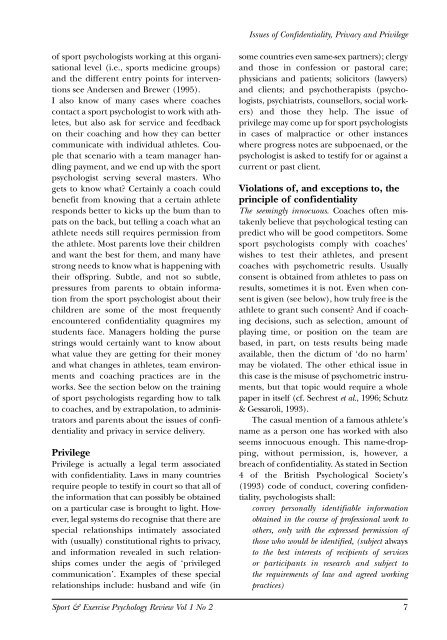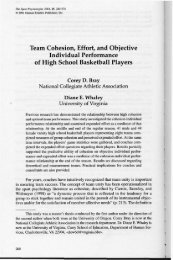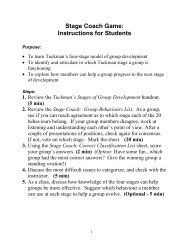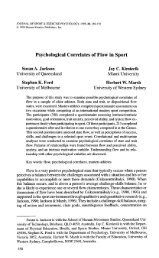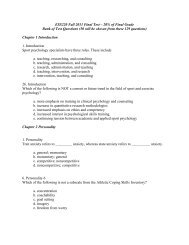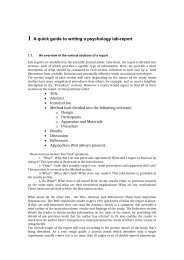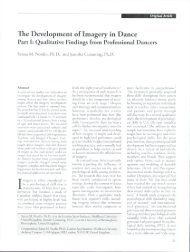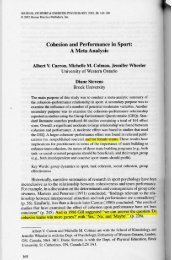Sport and Exercise Psychology Review - Sport Psychology Goes to ...
Sport and Exercise Psychology Review - Sport Psychology Goes to ...
Sport and Exercise Psychology Review - Sport Psychology Goes to ...
You also want an ePaper? Increase the reach of your titles
YUMPU automatically turns print PDFs into web optimized ePapers that Google loves.
Issues of Confidentiality, Privacy <strong>and</strong> Privilege<br />
of sport psychologists working at this organisational<br />
level (i.e., sports medicine groups)<br />
<strong>and</strong> the different entry points for interventions<br />
see Andersen <strong>and</strong> Brewer (1995).<br />
I also know of many cases where coaches<br />
contact a sport psychologist <strong>to</strong> work with athletes,<br />
but also ask for service <strong>and</strong> feedback<br />
on their coaching <strong>and</strong> how they can better<br />
communicate with individual athletes. Couple<br />
that scenario with a team manager h<strong>and</strong>ling<br />
payment, <strong>and</strong> we end up with the sport<br />
psychologist serving several masters. Who<br />
gets <strong>to</strong> know what? Certainly a coach could<br />
benefit from knowing that a certain athlete<br />
responds better <strong>to</strong> kicks up the bum than <strong>to</strong><br />
pats on the back, but telling a coach what an<br />
athlete needs still requires permission from<br />
the athlete. Most parents love their children<br />
<strong>and</strong> want the best for them, <strong>and</strong> many have<br />
strong needs <strong>to</strong> know what is happening with<br />
their offspring. Subtle, <strong>and</strong> not so subtle,<br />
pressures from parents <strong>to</strong> obtain information<br />
from the sport psychologist about their<br />
children are some of the most frequently<br />
encountered confidentiality quagmires my<br />
students face. Managers holding the purse<br />
strings would certainly want <strong>to</strong> know about<br />
what value they are getting for their money<br />
<strong>and</strong> what changes in athletes, team environments<br />
<strong>and</strong> coaching practices are in the<br />
works. See the section below on the training<br />
of sport psychologists regarding how <strong>to</strong> talk<br />
<strong>to</strong> coaches, <strong>and</strong> by extrapolation, <strong>to</strong> administra<strong>to</strong>rs<br />
<strong>and</strong> parents about the issues of confidentiality<br />
<strong>and</strong> privacy in service delivery.<br />
Privilege<br />
Privilege is actually a legal term associated<br />
with confidentiality. Laws in many countries<br />
require people <strong>to</strong> testify in court so that all of<br />
the information that can possibly be obtained<br />
on a particular case is brought <strong>to</strong> light. However,<br />
legal systems do recognise that there are<br />
special relationships intimately associated<br />
with (usually) constitutional rights <strong>to</strong> privacy,<br />
<strong>and</strong> information revealed in such relationships<br />
comes under the aegis of ‘privileged<br />
communication’. Examples of these special<br />
relationships include: husb<strong>and</strong> <strong>and</strong> wife (in<br />
some countries even same-sex partners); clergy<br />
<strong>and</strong> those in confession or pas<strong>to</strong>ral care;<br />
physicians <strong>and</strong> patients; solici<strong>to</strong>rs (lawyers)<br />
<strong>and</strong> clients; <strong>and</strong> psychotherapists (psychologists,<br />
psychiatrists, counsellors, social workers)<br />
<strong>and</strong> those they help. The issue of<br />
privilege may come up for sport psychologists<br />
in cases of malpractice or other instances<br />
where progress notes are subpoenaed, or the<br />
psychologist is asked <strong>to</strong> testify for or against a<br />
current or past client.<br />
Violations of, <strong>and</strong> exceptions <strong>to</strong>, the<br />
principle of confidentiality<br />
The seemingly innocuous. Coaches often mistakenly<br />
believe that psychological testing can<br />
predict who will be good competi<strong>to</strong>rs. Some<br />
sport psychologists comply with coaches’<br />
wishes <strong>to</strong> test their athletes, <strong>and</strong> present<br />
coaches with psychometric results. Usually<br />
consent is obtained from athletes <strong>to</strong> pass on<br />
results, sometimes it is not. Even when consent<br />
is given (see below), how truly free is the<br />
athlete <strong>to</strong> grant such consent? And if coaching<br />
decisions, such as selection, amount of<br />
playing time, or position on the team are<br />
based, in part, on tests results being made<br />
available, then the dictum of ‘do no harm’<br />
may be violated. The other ethical issue in<br />
this case is the misuse of psychometric instruments,<br />
but that <strong>to</strong>pic would require a whole<br />
paper in itself (cf. Sechrest et al., 1996; Schutz<br />
& Gessaroli, 1993).<br />
The casual mention of a famous athlete’s<br />
name as a person one has worked with also<br />
seems innocuous enough. This name-dropping,<br />
without permission, is, however, a<br />
breach of confidentiality. As stated in Section<br />
4 of the British Psychological Society’s<br />
(1993) code of conduct, covering confidentiality,<br />
psychologists shall:<br />
convey personally identifiable information<br />
obtained in the course of professional work <strong>to</strong><br />
others, only with the expressed permission of<br />
those who would be identified, (subject always<br />
<strong>to</strong> the best interests of recipients of services<br />
or participants in research <strong>and</strong> subject <strong>to</strong><br />
the requirements of law <strong>and</strong> agreed working<br />
practices)<br />
<strong>Sport</strong> & <strong>Exercise</strong> <strong>Psychology</strong> <strong>Review</strong> Vol 1 No 2 7


